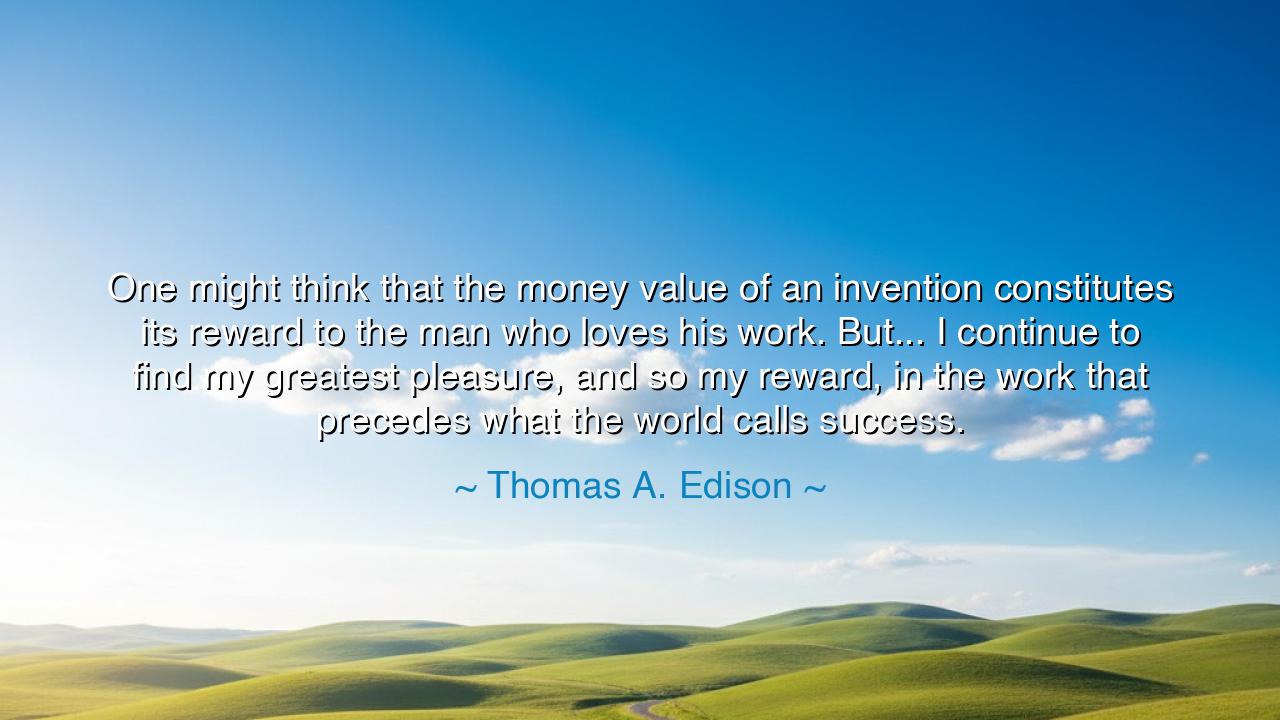
One might think that the money value of an invention constitutes
One might think that the money value of an invention constitutes its reward to the man who loves his work. But... I continue to find my greatest pleasure, and so my reward, in the work that precedes what the world calls success.






The words of Thomas A. Edison — “One might think that the money value of an invention constitutes its reward to the man who loves his work. But... I continue to find my greatest pleasure, and so my reward, in the work that precedes what the world calls success.” — carry the weight of one who labored long in the fires of creation. He reminds us that the true joy of the craftsman, the inventor, the artist, is not in the glitter of gold nor in the applause of men, but in the sacred toil itself. For the process, the struggle, the endless nights of trial and discovery — these are the true treasures, the hidden jewels that no market can measure.
The ancients understood this. The philosopher Aristotle spoke of eudaimonia, the flourishing of the soul, which comes not from wealth but from living in accordance with one’s purpose. Likewise, the Stoics taught that the joy of the wise man is not in outcome, which fortune controls, but in effort, which belongs to the self. Edison’s words echo these truths: what the world names success is but the shadow, while the substance lies in the act of creating, of striving, of pouring one’s soul into the work.
Consider Edison’s own life. He failed thousands of times before perfecting the incandescent lamp. By worldly measures, these failures were setbacks, even disasters. Yet he declared, “I have not failed. I have just found 10,000 ways that will not work.” In those long hours of experimentation, of burned filaments and shattered glass, he found not despair but joy. The reward was in the pursuit itself, in watching an idea inch closer to reality, in living the life of a man fully given to his work. Money and fame came later, but they were only echoes of the joy already found in the struggle.
History offers another witness: Michelangelo, who toiled for years on the ceiling of the Sistine Chapel. The world now beholds it as one of the greatest masterpieces of all time, but Michelangelo himself often groaned at the physical pain, the solitude, the endless labor of lying on scaffolds, brush in hand. Yet even in this hardship, he found the true reward: the act of creation, the bringing forth of divine beauty from stone and paint. When asked of his work, he did not boast of fame, but of the endless discipline that brought forth life from lifelessness.
Edison’s words also serve as a warning. Those who chase only wealth or recognition may achieve them, but they will soon find themselves empty, for such rewards fade quickly. Gold tarnishes, applause dies down, and titles are forgotten. But the joy of labor, the fulfillment of walking in harmony with one’s calling, is eternal. To live for the process rather than the prize is to taste a deeper kind of wealth, one that cannot be stolen or diminished.
The lesson is clear: if you would live a life of meaning, learn to love the work itself, not merely what comes after. Find joy in the small victories, in the shaping of the task, in the discipline of effort. For the world may or may not call you a success, but if you have delighted in the journey, then you have already received your reward.
Practical wisdom follows: whatever your craft — whether it be teaching, writing, building, healing, or serving — embrace the process. Do not wait for money or applause to give your work meaning. Instead, take each day’s labor as its own gift. Ask not, “What will I gain from this?” but rather, “What joy can I find in the doing?” In this way, you will walk as Edison did, with a spirit that finds its treasure not in outcomes, but in creation itself.
Thus, O seeker, remember Edison’s truth: success is but the shadow; the work is the substance. To love the labor, to rejoice in the pursuit, is to carry within yourself a wealth that no failure can diminish and no triumph can surpass. For in the act of creating, you are already victorious.






AAdministratorAdministrator
Welcome, honored guests. Please leave a comment, we will respond soon